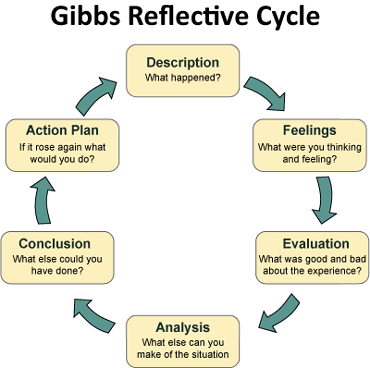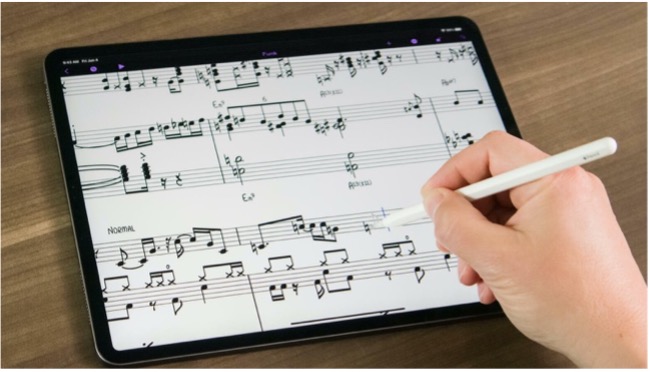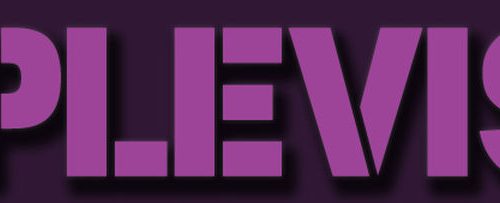Teaching is the art of assisting discovery
Coming from a family of teachers I already had an insight into the world of teaching. However, I wanted to experience teaching from a musical perspective. I contacted Claire, head of the Music department in Banbridge Academy. Her rapid response and enthusiasm immediately put me at ease. She outlined my tasks as a voluntary teaching assistant and shared essential data protection and safeguarding training courses for me to complete. The initial paperwork was daunting at first, but I understood that it is necessary when working with children
Period four of day one gave me my first teaching experience. It was in this task I was able to employ Gibbs reflective cycle (Gibbs, 1988). The importance of reflection “in the context of teaching, means being able to identify the actions and routes necessary in order to be a successful teacher” (Bennett, 2012, p.108).

Description:
My role was to provide GCSE compositional support to groups of three students for 35minutes. I extensively planned out the lesson and familiarised myself with the compositional element of the CCEA GCSE specification. I was provided with a workspace, (group room 2 to be exact) to carry out these lessons. I prepared a resource booklet for pupils where I described key compositional features such as instrument ranges, forms, what makes a good melody, metre groupings and variation techniques. In the lesson I spent the first half leading the students through the booklet, explaining each section and I allowed time for questions. The students came prepared with their Sibelius software compositions where we spent the second half listening and appraising their work. Advice was given to each student for them to make further adjustments. Claire felt that I would be an asset to the GCSE students due to my university knowledge of composition.

Feelings:
Exploration of both myself and students’ feelings is a key aspect to teaching. A teacher must be hyperaware of their pupils’ emotions and understand that they too may be able to read your emotions as rapport develops. My first support group was intimidating, and I felt nervous. My precise planning led me to worry about time management, specifically if I would be able to cover everything I intended to. I created a welcoming atmosphere by inviting students to talk about their experiences with composition. Most students struggled with composition which was discouraging to hear, and their feelings of confusion and stress was evident. This was a moment for me to provide for the pastoral needs of the pupils by giving encouragement. I explained the composition guidelines so that they knew exactly what examiners are looking for, immediately calming the students. I looked at their compositions, and most were very good which was encouraging for them. Thankfully I managed to stick to my strict plan and covered everything I intended to, despite the diverging pep talk. By the end of the lesson the atmosphere had shifted to a sense of relief and hopefulness.

Evaluation:
One positive aspect was that the students listened intently when I was talking and asked questions showing their interest. What didn’t go well was that every pupil had a negative view of composition creating a challenge I wasn’t prepared for. I had to think on the spot, I needed to breakdown this perceived view and show that composition isn’t ‘hard’. I played Benjamin Britten’s “a young person’s guide to the orchestra” and revealed some compositional features I had explained from my booklet that he used in his piece. I added that Britten created this 17-minute piece from a simple four bar melody which not only shocked the pupils but also reassured them. Using this visual and audio aid helped engage the pupils.

Analysis:
Students listening went well because of the mutual appreciation of music that they and I share. Music GCSE is an optional subject, so pupils have made a choice to study it usually because they enjoy music. Having small numbers in the group also allowed each student to have one-to-one support and feel more comfortable speaking aloud. However, I still felt I had authority, being given the formal title of ‘Miss Poots’. I think the reason pupils feel discouraged with composition is that they don’t have enough time in class to work on it, with only five periods a week of music compared to nine periods of science. Students are having to sacrifice other free times such as break and lunch to work on their compositions.

Conclusions:
I learnt that students can be hard on themselves and automatically criticise their work before commending it. This could’ve been more positive if the students came in with an open mind which should’ve been communicated to them beforehand. If they knew that these group sessions were an opportunity for them to learn more about composition and have fresh perspective, then the session would have been more positive. In the words of Burnard and Hennessy (2009), music provides “welcome relief, intriguing new challenges, much-valued opportunities to reflect on self and creativity” (p.15). Composition is a chance for pupils to show their creative side. Moreover, I will continue to encourage each student and use other resources such as my own compositions, famous compositional examples, and demonstrations.

Action plan:
In future compositional group sessions, I would approach them in the same way; well planned and organised. However, I want to develop my communication skills as I get to know the students. I understand that 35minutes per week isn’t going to completely change the attitude students have surrounding composition, but with support I hope to brighten their views and change their negativity into positivity which can be channelled into their work. Through this I want to express my own love for composition in hope that it will impact the pupils. After all, “You are, like it or not, a moral example to the children” (Bennett, 2012, p.80).

Bibliography:
Benjamin Britten – The Young Person’s Guide to the Orchestra (Official Score Video). Available at https://www.youtube.com/watch?v=JGxQVxgacSI (Accessed 10/11/2022).
Bennett, T (2012): Teacher Mastering the Art and Craft of Teaching. p.80, p.108.
Burnard, P, Hennessy, S (2009). Reflective Practices in Arts Education. p.15, p.79.
Gibbs, G (1988): Learning by Doing: A guide to teaching and learning methods. Available at https://thoughtsmostlyaboutlearning.files.wordpress.com/2015/12/learning-by-doing-graham-gibbs.pdf (Accessed 3/11/2022).
Poots, E (2022): Composition Resource Booklet. Available at https://drive.google.com/drive/folders/1PNl5FrqBPE22AmWRpj6nOqnHQp1ueYRn?usp=share_link (Accessed 10/09/2022).
A Helping Hand
You May Also Like

The Pen Is Mightier Than The Sword
24 November 2022
Securing My Placement: The Humbling Experience of Film Industry Rejection
24 November 2022
